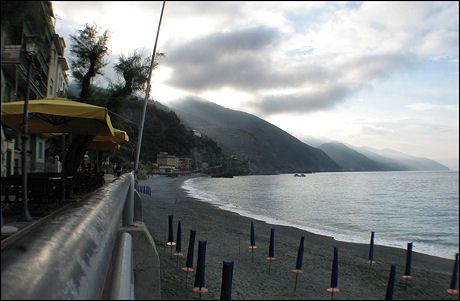Ulu Grosbard‘s extremely good and true Straight Time came out on DVD on 5.22, and it feels weird being in Italy (heading back to the U.S. tomorrow morning) and not being able to rent it, and not hearing or reading all that much about it online. Is everyone asleep back there? Except for Once and Knocked Up and I forget-what-other-films, the movie world is a relative desert right now, so the availability of Straight Time, Prince of the City and If… on DVD should be cause for a major heads-up. By the way, Los Angelenos will want to catch a special Straight Time screening and panel scheduled at the Los Angeles Film Festival on 6.23 at 6:30PM, at the Billy Wilder theatre in Westwood.
Black as McCartney?
Live Free or Die Hard costar Justin Long has told Collider’s Steve Weintraub about how he plays the late George Harrison in Jake Kasdan‘s Walk Hard: The Dewey Cox Story, a kind of Elvis movie co-written by Judd Apatow.
Long also says that Jack Black will play Paul McCartney, Paul Rudd will portray John Lennon and Jason Schwartzman will embody Ringo Starr. The reason these guys aren’t listed on any semi-official cast lists is that they’ve basically done cameo walk-ons. Black did one day as Mccartney; the others did either the same or similar work time. The scene they shot is a goof on the Beatles trip to India in late ’67.
Obama way ahead
So far (i.e., Monday, 6.4.07 at 5:56 am Los Angeles time), 36% of the respondents on a Drudge Report poll are claiming that Barack Obama was the easy winner in last night’s Democratic candidate debate in New Hampshire. New Mexico Gov. Bill Richardson is second at 15%, and Hilary Clinton has a 13% rating. I don’t know what kind of political-philosophical leanings Drudge Report readers have, but it’s significant that Obama, who is always ranked second-place (behind Clinton) in general political opinion polls, has come out so far ahead in this instance.
Apatow on Rogen
“He’s 25 now. I met him when he was 16 years old. He’s one of these freaks of nature. He came out of his mother’s womb with a fully formed comic identity.” — Judd Apatow speaking about Knocked Up star Seth Rogen.
Cinqueterre pics

Southeastern view from Monterosso, one of the five coastal Cinqueterre towns on the northwestern Italian coast — Monday, 6.4.07, 7:25 am; Sunday, 6.3.07, 1:55 pm; ancient cliffside condos; Monterosso cliff sculpture; ditto; 6.4.07, 9:05 a.m.
Finke vs. Film Ick
Film Ick‘s Brendon Connelly vs. Deadline Hollywood Daily’‘s Nikki Finke over Finke’s dismissal of Eli Roth‘s Hostel, Part II as “disgusting” without (apparently) having seen it.
Connelly is on the right side of the debate, of course. Hostel, Part II may indeed be vile, but it may have striking “whoa” moves at the same time. We all know what the torture-porn game is about and the core psychology driving it, but you have to give the devil (i.e., Roth) his due and watch the damn thing, or at least some of it.
Painful as it sometimes can be, you have to go to a screening (or a public performance) of a given film and sit through 20 to 30 minutes worth before venting an opinion. Obviously not about the entire film but about how those first 20 or 30 minutes were so painful to sit through that you either had to leave or shoot yourself, etc. Life is way, way too short to sit through a godawful movie. I am proud, proud, proud of my early walkouts.
Weekend numbers
Pirates of the Caribbean: At World’s End experienced one of the steepest post-Memorial Day opening drops in Hollywood history, plummeting 62 % for an estimated $43.2 million haul.
Box-Office Mojo’s Brandon Gray reports that the deeply loathed Jerry Bruckheimer-Gore Verbinski pic will “fall well short of” Pirates of the Caribbean: Dead Man’s Chest‘s $423.3 million tally by the end of its run. POTC: AWE has earned $216.5 million so far. At the same point, says Gray, POTC: DMC was down 54 % to $62.3 million for a $258.4 million total.
Judd Apatow’s Knocked Up took in roughly $29.3 million on approximately 3,700 screens at 2,871 theaters. It opened on the same date as last summer’s The Break-Up, which took in $39.2 million on the first weekend.
Doris Day reconsidered
Nellie McKay attempts a reselling of Doris Day — who she was (or seemed to be) on-screen, who she may have been off-screen, the bizarreness of her personality, her weirdly virginal nature — in a 6.3.07 N.Y. Times piece, which I for one am not buying for an instant. I admire Day’s work on behalf of animals, but she always played exceedingly strange women, especially from the mid ’50s on. Try and watch her labored performance in Alfred Hitchcock‘s 1955 version of The Man Who Knew Too Much without wincing.
Freidman on Travolta, “Hairspray”
“You really have to see John Travolta to believe him, especially toward the end of Hairspray when he finally lets loose — dressed in a fat suit as a woman in a red tutu and high heels — and dances up a storm in the film’s finale,” writes Fox 411’s Roger Friedman.
“I don’t know if it’s an Oscar performance, but I do know that when Hairspray is shown in big theaters (I saw it in a screening room, still a little unfinished), audiences are going to go wild with cheers and whistles. Travolta even signals the audience with his now-trademark ‘cat eye’ from Pulp Fiction as he launches like a spinning top onto the stage of the fictional Corny Collins Show. You can only love it. Somehow he brings that old Travolta warmth and charisma to a crazy costume.”
Franchise directors
An okay but moderately boring Associated Press piece about franchise directors — Sam Raimi, Gore Verbinksi, Peter Jackson, Paul Greengrass, Tom Shadyac, etc. “Unlike Hollywood in earlier days, when any old director might take on a sequel, the same filmmaker continues to oversee the latest installments of most big franchises out this summer,” etc.
Rome pics #4

Under the Pantheon this morning and resting soundly; these guys were sleeping three or four feet away — Sunday, 6.3.07, 6:45 am

Pantheon just after dawn; Grindhouse, POTC: AWE and Ed Harris‘s Beethoven biopic playing at Rome miniplex a few blocks south of Via Veneto; two or three blocks further south; gathering in Camp de Fiori — Saturday, 6.2.07, 7:45 pm; Campi de Fiori; ditto
Grant and Clooney
The notion of George Clooney being the new Cary Grant, or even that he’s vaguely Cary Grant-ish, was thin from the get-go. I thought it had been tossed aside, frankly, but now here’s David Thomson kicking it around again. Clooney himself would probably be the last guy to wink at this idea.
The entertainment world is full of tallish, trim, brown-eyed, good-looking, impeccably mannered lady-pleasers, and these superficial traits are nearly all these two men have ever shared, so to speak, save for a knack (a gift in Grant’s case) for playing light comedy and an agreeable way with broad comic gestures — double-takes, eyeball-popping, etc.
The thing that sets Grant apart is that urbane sophisticated Grant persona (i.e., an act that he developed bit by bit in the mid to late 1930s), that classy but almost testy sense of reserve (he always seemed to be masking his deep-down wants and hurts) and that wonderfully crisp and resonant voice, Americanized Bristol accent and all.
Clooney, by contrast, always seems to play a fairly open-minded good egg, confused or offended at times but generally smooth and amiable, open to all queries and opinions, etc. He doesn’t ever seem to duck or hide from anyone or anything. Plus he doesn’t have Grant’s practiced sense of polished, eyebrow- raising irony. His deepish voice is pleasing but with a kind of twangy Midwestern flavornig, which, for me, significantly reduces the would-be air of sophistication.
I don’t know why I’m going on about this — he and Grant are fairly different ducks who don’t even swim in the same pond. Not to put down Clooney for who and what he seems to be. But Grant is world-class. I wonder, now that I think of it, if Grant would have been as big in movies if he had been born, say, in 1955 or there- abouts? Would his temperament and acting style have meshed with the ’80s, ’90s and afterwards, or was “Cary Grant” a manifestation that could only have been shaped and refined and taken flight in the ’30s, ’40s and ’50s?

